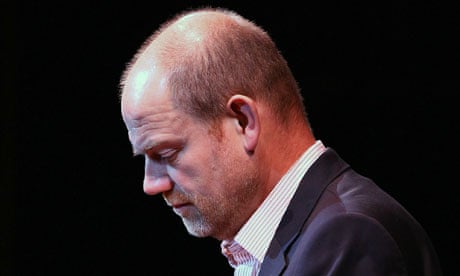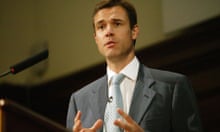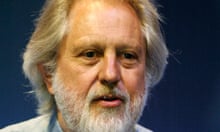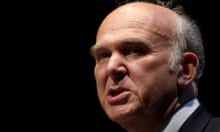Mark Thompson, the BBC's director-general, was forced to apologise to the corporation's regulator last month over his decision to join a group of media companies who signed a letter criticising Rupert Murdoch, it emerged today.
The BBC Trust, led by Sir Michael Lyons, "expressed concern" about whether it was "appropriate" for Thompson to sign the controversial letter, which called on ministers to intervene in News Corporation's proposed £8bn buyout of BSkyB.
Today, the BBC Trust decided to release part of the minutes of its 21 October meeting early. They record that Thompson "acknowledged that he had not discussed the co-signing of the letter directly with the chairman [Lyons] or engaged with trustees".
Capping a stormy weekend, in which BBC journalists mounted a 48-hour strike, the minutes record that Thompson "stated his regret" for wading into the row about the News Corp buyout without informing the body that regulates him.
Critically, though, the trustees did not say they were unhappy with the contents of the letter – rather that they were unhappy with the process that was followed. The minutes recorded that Lyons had his colleagues chose to make "no further comment" on the letter's substance.
The letter Thompson signed was sent to Vince Cable, the business secretary, and warned the "proposed takeover could have serious and far-reaching consequences for media plurality" amid concern on the part of broadcasters and newspaper groups that the sheer size of the combined News Corporation and Sky in the UK would leave rivals unable to compete.
Other signatories included Andrew Miller, chief executive of Guardian Media Group; Sly Bailey, chief executive of Daily Mirror publisher Trinity Mirror; Murdoch MacLennan, the chief executive of Telegraph Media group, publisher of the Daily Telegraph; and bosses of BT, Channel 4 and the company behind the Daily Mail.
Critics of Thompson, including Stephen Mitchell, the BBC's deputy director of news, argue that he should not have become personally involved in raising concerns about the Murdoch bid. A leader in the Times, a paper owned by News Corporation, said that Thompson "has embroiled his taxpayer-funded organisation in a political and commercial battle that it should have nothing to do with".
However, section 44 of the charter that governs the BBC allows its director-general to express a view on "matters of public policy" in "broadcasting or the provision of online services". Sources close to Thompson said it was undisputed that it was legitimate for him intervene in some matters of media policy.
Thompson also agreed to relinquish his role as "editor-in-chief" as regards News Corp's bid for Sky. It is understood the director-general signed a "file note" in which he "recused himself" and gave ultimate authority for coverage of the story to his deputy Mark Byford – to avoid any appearance of a conflict of interest.
Fortunately for Thompson the dispute is rendered somewhat academic after Cable decided to refer the merger to media regulator Ofcom last week.
It also emerged that the 48-hour strike had little impact on viewers: ITV's struggling Daybreak, fronted by Christine Bleakley and Adrian Chiles, only managed 800,000 viewers compared with BBC Breakfast's 1.3 million. The BBC Ten O'Clock News drew 4.4 million, compared with 2.5 million for ITV's News At Ten.



